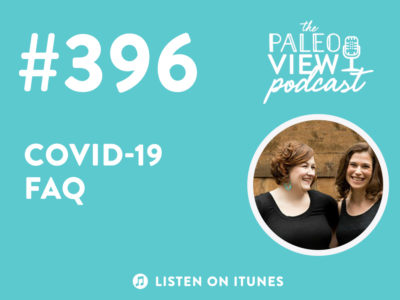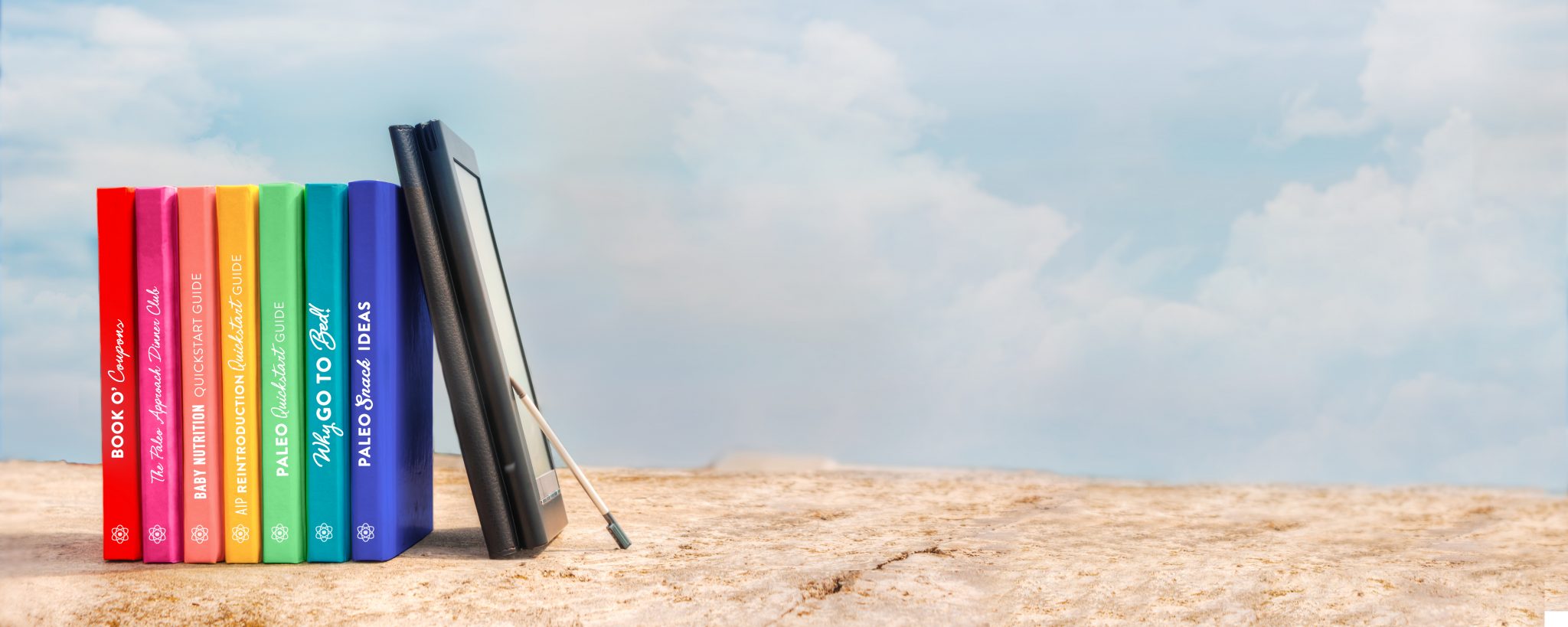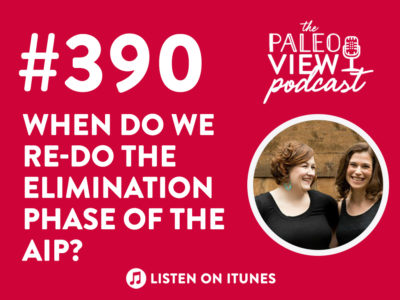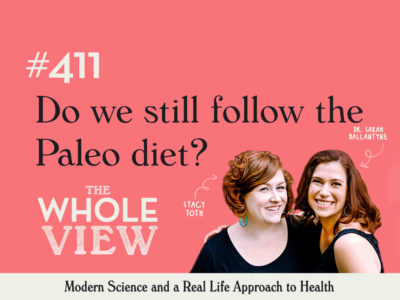On this week’s episode, Stacy and Sarah host a follow-up discussion to episode 394, to answer listeners’ questions on covid-19. What does the latest data say on what to expect? What are the biggest risk factors? And are there ways to minimize our risk or symptoms if we do get sick? All of this and more on this week’s episode!
Table of Contents[Hide][Show]
If you enjoy the show, please review it on iTunes!
The Paleo View (TPV), Episode 396: Covid-19 FAQ
Welcome back to the Paleo View, episode 396. (0:40)
Stacy and Sarah are doing a follow-up show to episode 394 to answer listener’s frequently asked questions.
Since then, a lot has changed and Stacy and Sarah want to empower listeners with the latest information.
Stacy wants to remind people that if you are home with your kids, be mindful of what you are exuding in front of them.
Calm and reassurance is critical with kids right now.
A Follow Up Show
Sarah and Stacy each shared a bit about how they are parenting through this unique time.
It is ok to be fearful and anxious, but make sure you find the appropriate outlet and time to share on your feelings.
A lot can change by the time this show airs, but Stacy and Sarah are hoping that these points will still be helpful as this continues to evolve in the US.
Save 70% Off the AIP Lecture Series!
Learn everything you need to know about the Autoimmune Protocol to regain your health!
I am loving this AIP course and all the information I am receiving. The amount of work you have put into this is amazing and greatly, GREATLY, appreciated. Thank you so much. Taking this course gives me the knowledge I need to understand why my body is doing what it is doing and reinforces my determination to continue along this dietary path to heal it. Invaluable!
Carmen Maier
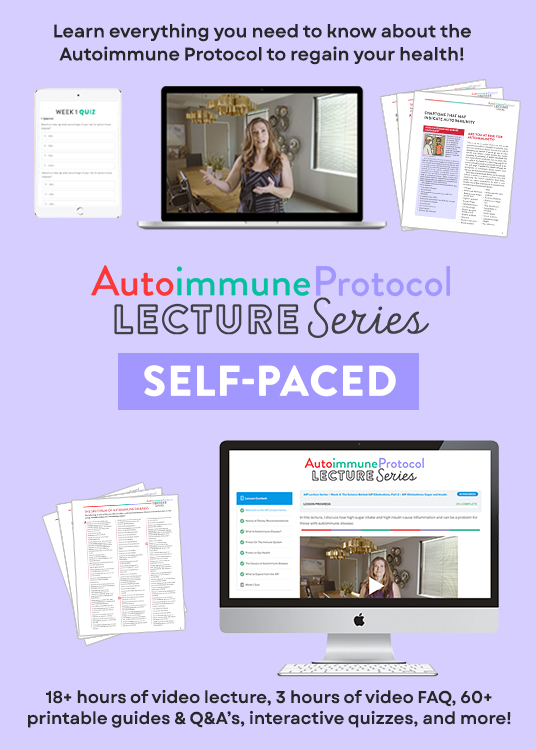
For people who aren’t feeling symptomatic, we could still be harboring the virus and give it unknowingly to people.
This is why we are all in quarantine and it is incredibly important to understand this.
There is this other side of the quarantine equation that has to do with taking healthy people out of the possible infection pool.
Sarah talked about other country’s quarantine practices and why the US has chosen the course that we have.
If we can slow the infection rate, we will spread this out over a longer period of time, which is good because it means we won’t overwhelm the medical system.
The whole point of all these steps is so that people who need treatment can get it.
We are trying to protect the more vulnerable people.
Recognize that some people who don’t appear vulnerable are getting a severe course of this disease, and there is no way to predict how bad it is going to be.
We are, figuratively, coming together as a community so that we can protect our communities from overwhelming our local medical care.
Updates
Stacy quickly shared an update on one of the two bills that were discussed on last week’s episode. (12:19)
Sarah has collected representative questions from the most common discussions that are happening on both Stacy and Sarah’s channels.
WHO is quoting global mortality at 3.9%.
However, Sarah wants to emphasize that this is still very likely an overestimation due to the undercounting of mild cases.
Almost no countries are testing for mild cases right now.
South Korea still remains the exception of a country that is testing at the right level.
All other countries still need to ramp up for their testing capacity.
The mortality rate has climbed in South Korea to 0.9%, which is ten times higher than the seasonal flu.
Although this is better news than what WHO is reporting right now.
The Latest Findings
We are still looking at the scientific literature.
We are still looking at about 80% of people having a mild disease course.
However, Sarah wants to emphasize here what mild means in this context.
It encompasses everything short of pneumonia, and all the way down to almost no symptoms.
15 to 20% of people who are considered critical will need medical care, like supplemental oxygen.
Something like 5% of the cases are requiring more advanced support for the respiratory system.
On average, for mild symptoms, people are sick for about two weeks.
The severe and critical cases are lasting three to six weeks.
When you see news stories of worst-case scenarios, know that we completely have it in our power to make sure that things don’t escalate to that point.
The people who are at higher risk of having a severe course are still older people, which starts at 50.
The other people who are more vulnerable are people with pre-existing conditions and immunocompromised people.
What people are dying from with covid-19 is acute respiratory distress syndrome or multiple organ failure syndromes.
Respiratory Risk Factors
Stacy asked Sarah, “do you think it’s realistic to say that if you are prone to respiratory infections that you would need to be especially mindful during this period?”.
There is currently no evidence that those with asthma are considered higher risk.
Stacy shared her thought process behind this.
At this point, having a history of bronchitis or pneumonia is not a risk factor.
However, some of the things that might contribute to a high frequency of bronchitis and pneumonia may be risk factors.
The lifestyle factors are still our top action items at this time.
Immunocompromised
Are all of us with autoimmune diseases automatically considered immunocompromised? (26:03)
The answer is no.
Autoimmune disease does not automatically imply immunocompromised.
This phrase is referring to people with HIV/AIDS, cancers that are impacting immune cells, cancer patients who are undergoing radiation or chemotherapy, transplant patients that are on immune suppressants, and those with genetic diseases that affect the immune system.
That being said, some autoimmune disease suffers are also immunocompromised.
If you are taking disease-modifying drugs or steroids to manage an autoimmune disease, your doctor may tell you that you are immunocompromised.
In general, an autoimmune diagnosis does not mean that you are immunocompromised.
Sarah wants to reassure listeners that you are not automatically in a high-risk category because you have an autoimmune disease.
If you have had great success managing your autoimmune disease with functional medicine approaches and diet and lifestyle, your immune system is probably well equipped to handle a viral infection.
Levels of Severity
Is the severity of the disease going to be worse for those with autoimmune conditions? (29:48)
Sarah shared information from this, this, and this study to explain what the research currently shows.
There is a time and a place for medication.
Do not discontinue your medicine without talking to your doctor if you are on immunosuppressants.
If you are on immunosuppressants, yes, you would be considered a higher risk.
Make a decision with your healthcare provider about the best path forward and take all of the precautions to protect yourself from exposure to covid-19.
It is not that autoimmune diseases increase your risk for a more severe course, it is that the immunosuppressant drugs potentially increase risk.
Be sure to call the doctor’s office first before showing up.
Cleaning vs. Disinfecting
Should I be used an antibacterial soap to wash my hands? And will this impact the beneficial bacteria on my skin?(36:40)
A similar question Stacy and Sarah has received has to do with the effectiveness of natural soaps.
There’s a technical difference between cleaning (where you’re removing bacteria and viruses by trapping them in your cleaning solution and rinsing/wiping them away) versus disinfecting (where you’re killing the bacteria and viruses with a powerful antimicrobial chemical).
For cleaning, yes, natural soaps such as Dr. Bronners work, make sure you’re rinsing/wiping clean, depending on the application.
For disinfecting, try 70% isopropyl alcohol (rubbing alcohol).
The EPA has a list of disinfectants that should be effective against SARS-CoV-2 (the virus that causes covid-19) here.
Stacy has a blog post here with additional product recommendations.
Sarah pointed out that there are a lot of disinfectants out there that haven’t actually been tested for their effectiveness.
Be sure to check the CDC to see if your products are actually disinfecting.
If you are thinking about using essential oils, please refer to this podcast episode.
Sarah shared her thoughts on how to best check for a product’s effectiveness against covid-19.
Treatment
What can we take to help us feel better if we do get covid-19? (47:25)
In moderate to severe cases, call your doctor and find out what their recommendations are.
Please know that if you are in that 80%, rest and hydration are still your primary strategies.
If you have a fever, if it is not dangerously high, try not to take any medicine for it.
Sarah noted that a high fever, above 104F (and lower from susceptible individuals, you probably already know if this applies to you) can cause seizures.
If you are going to take something, avoid NSAIDs (which suppress some aspects of the immune system), and take acetaminophen.
Call your doctor if you can’t get your fever down.
If it hurts in your chest when you are coughing, call your doctor.
And if you have any doubts, don’t be afraid to call your doctor.
Any symptom relief that is going to improve sleep is going to be beneficial.
More Ideas
For cough, honey is a surprisingly good cough suppressant (even recommended by Mayo clinic), which you can either add to herbal tea (lots of antioxidants!) or just take a spoonful.
Eucalyptus oil, diluted with something like coconut oil, rubbed onto the chest may help act as an expectorant and cough suppressant.
If you happen to have a red light therapy device at home, it will help with your joint pain.
There is nothing from a lifestyle perspective that is going to prevent you from getting something.
You can Paleo as hard as you can, but sometimes that is not going to change anything.
For a concentration amount of information on what you can do from a diet and lifestyle standpoint, refer back to this podcast episode.
Get enough sleep, manage stress, have plenty of low/moderate activity throughout your day, and avoid nutrient deficiencies.
Sarah wants to really emphasize that the magnitude of effect from supplements is very small.
It is far more important to avoid nutrient deficiencies and to get your nutrients from foods.
Stacy is personally working hard to manage her sleep habits.
Look at all the things that are making you stressed and anxious, and identify what is in your control.
Instead, look at what you can focus on and what you can do best.
Supplements
We are conditioned now that when we don’t feel well we take a pill. (1:02:10)
Even in alternative health, there is lots of food-based supplements.
Functional health doctors love to give supplements.
We don’t yet have data on how supplements impact covid-19.
There is no pill that is going to substitute for going to bed early or doing something to reduce stress levels.
Other than a vitamin D supplement if you are vitamin D deficient, there is nothing else that you are going to be able to take that is going to help.
Even as Stacy and Sarah talk about supplements that are going to be beneficial, they are talking about very small effects compared to the lifestyle factors.
Colloidal Silver Products
The answer is no colloidal silver products are not going to help. (1:04:31)
Data on colloidal silver products are incredibly mixed.
There have been studies showing absolutely no antibiotic activity, and a couple have shown no antiviral activity.
It is also very easy to important to know that you can overdose on silver and it can be toxic.
The upper limit seems to be context-dependent.
Elderberry
There are two different schools of thought online.
Sarah wrote about the study showing that elderberry can reduce the severity of symptoms and duration of relevant viral infections.
It does not seem to prevent viral infections.
And should not be taken daily since long-term safety has not been established.
Studies evaluate 5-day intervention “at the first sign of illness”.
Some people are recommending against Elderberry due to concerns that it may increase the severity of or increase the risk of cytokine storms.
The safety of elderberry has never been tested long-term.
A cytokine is a chemical messenger that the immune system uses to communicate with itself.
There are dozens of different cytokines.
Sarah shared more on cytokines and what they do in the body.
There has been some cytokine profiling done of those patients with covid-19, and they are showing that this is potentially causing the complications.
The cytokine storm is not unique to covid-19.
Doctors are trying to figure out the best treatment protocols.
There is a bit of research out there on the effects on the elderberry, and Sarah broke those down in greater detail.
Sarah appreciates the voices of caution on the use of elderberry out there.
The fact is we don’t know if it would help with covid-19.
All in all, Sarah is not convinced elderberry would contribute to cytokine storm, but caution is the better part of valor.
Additional Supplements
Other people have asked about vitamin C, zinc, and vitamin D. (1:21:09)
With vitamin D, you are definitely supporting your immune system by addressing a deficiency.
Testing your vitamin D levels is a great action item right now.
Zinc supplementation has been shown to reduce infection rates.
However, 73% of Americans don’t get enough zinc.
Sarah recommends using a food journal like MyFitnessPal or Cronometer to see how much zinc you are getting from your food.
Make sure you are choosing foods that help you get enough zinc.
Sarah thinks there is a compelling reason to avoid deficiency and not a compelling reason to supplement.
The same can be said for vitamin C.
Eating fruits and vegetables with vitamin C are going to provide a number of benefits.
There are also recommendations floating around to take SA glutathione and vitamin A as well as d+k2.
In general, Sarah thinks it’s best to be skeptical of any claims that a supplement will protect you from covid-19.
All of the supplements recommended by Dr. Lynch are all general immune health nutrients, and certainly being deficient is problematic.
There’s no evidence that glutathione, vitamin A or K2 supplementation can reduce infections or infection severity.
Be sure to talk to your doctor about supplementation for feedback unique to you.
The things that are actually going to help us is social distancing, hand washing, cleaning, getting enough sleep, managing stress, being active, getting a nutrient-dense diet, and following quarantine protocols.
Additional Suggestions
Stacy wants to emphasize the mentality part of this. (1:26:30)
There is endless science on how stress negatively affects our bodies in a multitude of ways.
Look for ways to help yourself feel better.
Don’t listen to this podcast and feel stressed that you need to be doing more things.
Take a deep breath or go for a walk.
Stacy shared ways that she is looking for things she can own and the problems she can solve.
There are things that each of us can control.
Feel grateful for what you do have, whatever that may be.
Most of us our families are healthy, and you can be appreciative and grateful for that.
The more things you can be grateful for the more it is going to help you calm down and destress.
Mail is still being delivered, trash is still being picked up, grocery stores are still open.
There is a lot of gratitude we can find around us, we just have to be willing to pause and look for it.
Wrap Up
Stacy shared her appreciation for all the prep-work Sarah did for this week’s podcast episode.
Sarah shared with listeners that we will host as many covid-19 podcast episodes as needed throughout this pandemic. (1:31:06)
If you have more questions as the situation evolves, please pass those along use Stacy and Sarah’s contact forms on their sites or submit via social media.
Thank you again for tuning in! And for your support, for leaving reviews, and for using the affiliate links on their sites.
Stacy echoed Sarah’s appreciation for all that the listeners and fans do to support their work.
Thanks for listening! Stacy and Sarah will be back again next week! (1:33:36)


